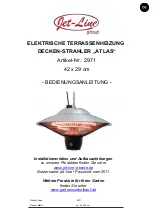
17
Maintenance
Only original Truma parts may be used for maintenance and
repair work!
The device must be descaled on a regular basis (at least twice
a year).
We recommend the Truma system care set for cleaning, dis-
infecting and looking after the boiler. Other products – in par-
ticular products containing chlorine – are unsuitable.
The effectiveness of the use of chemicals to combat microor-
ganisms in the unit can be increased by heating the water in
the boiler to 70 °C at regular intervals.
Move power selector switch to gas operation (d) to do this.
Move the rotary switch on the control panel to position (I –
summer operation) 60 °C. The green (k) and yellow (p) LEDs
light up.
Once the water in the boiler has reached a temperature
of 60 °C, the burner will switch off and the yellow LED (p)
will go out. The unit must stay switched on for at least 30 min-
utes and no warm water may be removed. The residual heat in
the heat exchanger will heat the water up to 70 °C.
Fuses 12 V
The fuse is in the electronics beneath the connection cover.
Replace the unit’s fuse only with an identical fuse.
Device fuse: 10 A – slow – (T 10 A)
T 10 A
Fuses 230 V
The fuse and the power supply lines must only be replaced by
an expert!
The unit must be disconnected from the mains (all poles)
before opening the electronic housing lid.
The fuse is in the power electronics (16) beneath the
electronic housing lid.
This fine fuse must always be replaced with a fuse of the
same type: 10 A, slow, interrupting capacity “H”.
T 10 A
16
Overheating protection 230 V
The 230 V heating facility has a mechanical overheating
switch. If the 12 V power supply is interrupted during opera-
tion or during the after-run period, for example, the tempera-
tures within the unit could activate the overheating protection.
To reset the overheating protection, allow heater to cool,
remove connection cover and press red reset button.
Disposal
The device must be disposed of in line with the administra-
tive regulations of the respective country in which it is used.
National regulations and laws (in Germany, for example, the
End-of-life Vehicle Regulation) must be observed.
In other countries, the relevant regulations must be observed.
















































